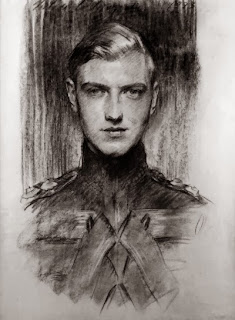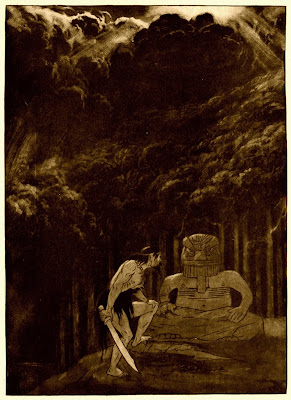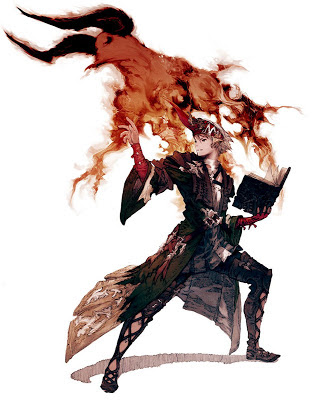Yet another draft of the Summoner class. Not sure why it has been so hard to nail down something that I like longer than a few days. I ran a game with someone playing the previous version, and one spirit felt almost too useful, while another seemed to be mostly a liability. Also, breaking creatures down by spell level is fussy and inconsistent and makes it hard to drop into any DnDish game. I also wanted to focus more on Things Going Wrong, as well as having more guidance on how the critters actually act. Also tries to scratch an itch I had with the 4e Warlock. The patrons felt more like an excuse for shooting laser beams than big nasties with motivations of their own.
Summoner A class for LotFPHP and Saves as Cleric, Experience as Elf
Summoners call forth spirits. They can only summon spirits with whom they have made a pact. Forming a pact simply requires the spirit’s acquiescence, which can be acquired through violence, deception, persuasion, or bribery. Spirits follow commands delivered verbally and in person by their Summoner to the letter, and often try to twist the words of an imprecisely delivered order, though they will do their best to conceal their ability to do so.
The sum of the HD of all Spirits a Summoner has pacts with cannot exceed the Summoner’s level. When a Summoner gains a level, they can either raise the HD of a Spirit they already have a pact with, or leave the level open to make another pact later. Summoners start with a single 1 HD spirit.
Summoning or dismissing a spirit takes one full round. If a spirit is reduced to 0 HP or fewer, the Summoner takes d6 damage per spirit HD, and the spirit cannot be summoned until it has positive HP. Spirits recover a number of HP equal to their level per day. They cannot regain HP any other way.
Spirits can only cast certain spells, but gain spells per day as a Magic-User. They do not need to prepare spells to cast them; instead, they can expend a spell slot to cast any spell with a level equal to or less than the slot’s level. Any negative effects from casting a spell are visited upon the Summoner.
All spirits have the following attributes, unless otherwise noted:
Max HP: +d6 per level
Attack Bonus: equal to half level
AC: 12+half level
Saves: 12-half level
Damage: d12 (melee)
Movement Speed: As running unencumbered human
Right now I only have 2 spirits because Lamentation of the Flame Princess has a relatively small spell list (especially at higher levels), and I want to keep the spirits’ spells distinct and thematically coherent.
RED MADAMA
Spirit of Insanity, Compulsion, and Change
Red Madama is a wicked butterfly demon, a spirit of air and madness. When she is called forth, the Summoner can transform into her at will, leaving behind a single set of instructions that she will follow to the letter. In order to change back or give new orders, the Summoner must succeed a Wisdom check. In combat, Red Madama and the Summoner take separate turns, and track their HP, attributes, and status effects independently, transforming back and forth without a Wisdom check as their turns arise.
When she is acting under her own power, Red Madama is grandiloquent, arrogant, and generally insane. She is willing to place herself in terrible danger in pursuit of impractical and elaborate schemes, which may or may not align with the Summoner’s interests. Red Madama often pursues extraordinarily violent revenge against those she believes have slighted her, but will also act with destructive generosity towards those she thinks have helped her.
Spells Known
Generally pertain to illusion, delusion, and transformation
I: Cause Fear, Charm Person, Command
II: Change Self, Forget, Phantasmal Force
III: Howl of the Moon, Phantasmal Psychedelia, Suggestion, Fly (uses butterfly wings)
IV: Confusion, Hallucinatory Terrain, Polymorph Self
V: Chaos, False Seeing (Reversed True Seeing), Insect Plague (red butterflies, not locusts)
VI: Babble (Reversed Tongues), Geas, Phantasmal Supergoria
VII: Unholy Word, Power Word Stun, Prismatic Spray
VIII: Antipathy/Sympathy, Demand, Mass Charm Person
IX: Shapechange, Polymorph Any Object, Symbol, Weird Vortex
MOTHER OF THE DEPTHS
Spirit of Secrets, Dark Knowledge, and Deep Seas
 |
| clothing by Iris van Herpen |
The Mother of the Depths is a hadopelagic sea-demon from beneath the bottom of the world. She manifests as a tall woman wreathed with nautiloid limbs. She can only be summoned from bodies of water with a depth greater than an inch and a diameter greater than a foot, and she cannot set foot on dry land. However, she can move instantly between any two bodies of water in line of sight of each other. She can attack any target in melee range of any body of water in line of sight.
When she find a way around her Summoner’s orders, The Mother acquires as many specimens, artifacts, and pieces of knowledge as possible. She holds power over secrets, and so she will also try to erase little-known pieces of information to which she already has access; this includes destroying books and killing people. The Mother is patient, and will sometimes forgo taking advantage of loopholes in her Summoner’s orders in hopes that they will make the same error at a more expedient time.
Spells Known
Generally pertain to necromancy, darkness, and the discernment
I: Comprehend Languages, Darkness (Reversed Light), Turn Undead
II: Forget, Locate/Hide Object, Ray of Enfeeblement
III: Bestow Curse, Speak With Dead, Strange Waters
IV: Polymorph Others, Wall of Ice, Wizard Eye
V: Airy Water, Animate Dead, True Seeing
VI: Shades, Tongues, Legend Lore
VII: Part Water, Control Weather, Unholy Word
VIII: Demand, Trap the Soul, Vision
IX: Imprisonment, Time Stop, Power Word Kill





















